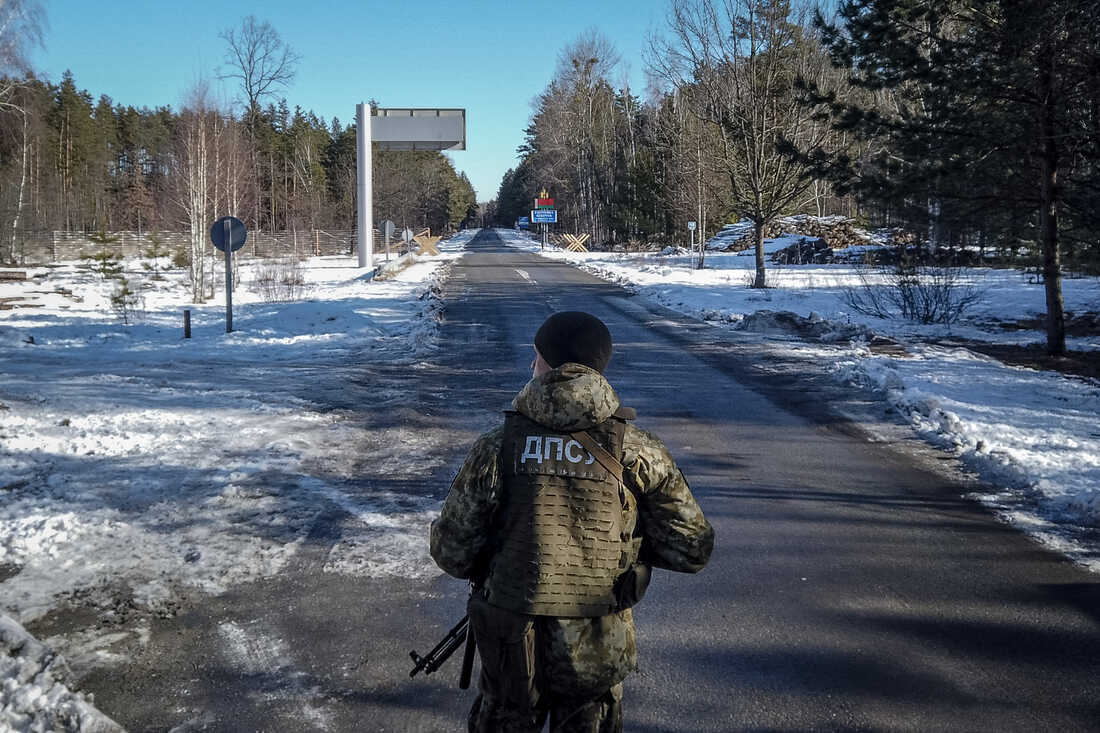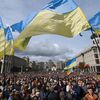[ad_1]

A member of the Ukrainian State Border Guard stands watch at the border crossing between Ukraine and Belarus on Saturday.
Chris McGrath/Getty Images
hide caption
toggle caption
Chris McGrath/Getty Images

A member of the Ukrainian State Border Guard stands watch at the border crossing between Ukraine and Belarus on Saturday.
Chris McGrath/Getty Images
The United States will “respond swiftly and decisively” to further Russian aggression against Ukraine, President Biden told Ukrainian President Volodymyr Zelenskyy on Sunday, as U.S. officials continue to warn that a Russian invasion could happen any day.
Tensions remain sky-high over the situation along Ukraine’s borders, where the U.S. says that a buildup of Russian forces and equipment along the country’s east, north and south has now reached a point where an attack could begin this week.
On Sunday, Biden and Zelenskyy spoke by phone for about 50 minutes and “agreed on the importance of continuing to pursue diplomacy and deterrence,” according to a White House readout of the call.
The conversation followed Biden’s call on Saturday with Russian President Vladimir Putin, in which the two men spoke for over an hour.
Afterward, a senior Biden administration official, speaking on condition of anonymity, described the conversation with Putin as “professional and substantive,” but added that “no fundamental change” was made to the tense dynamic that has unfolded over the past month.
Western leaders worry the window for diplomacy may be closing
French President Emmanuel Macron, who has taken a prominent role in the effort to find a diplomatic way out of the crisis, also spoke at length by phone with Putin on Saturday, according to Macron’s office. German Chancellor Olaf Scholz will visit both Kyiv and Moscow this coming week.
The calls and visits come amid fears that the window to find a diplomatic way out of the crisis may be closing as Russia readies its forces for a possible invasion.
“An invasion, a major military action could begin by Russia in Ukraine any day now. That includes this coming week, before the end of the Olympics,” said Jake Sullivan, the White House’s National Security Adviser, in an interview Sunday with CNN. The Olympics, which are being held in Beijing, end on February 20.
U.S. officials have cited an acceleration of the military buildup, along with the movement of troops closer to the border with Ukraine, as reasons for the heightened worries. Roughly a dozen countries have urged their citizens to leave Ukraine, including the U.S., U.K. and Germany.
“We have good sources of intelligence, and they’re telling us that things are building now to some sort of crescendo opportunity for Mr. Putin,” said John Kirby, a Pentagon spokesperson, speaking in an interview with Fox News Sunday. “We recognize that the time component here seems to be shrinking, and that gives us all cause for concern.”
Russian forces now surround Ukraine on three sides
Russia has stationed well over 100,000 troops around Ukraine’s borders, including some 30,000 troops stationed in Belarus to Ukraine’s north, where the border is just about a 100-mile drive from the Ukrainian capital. In the south, the Russian navy is conducting major exercises in the Black Sea. And to its east, more tanks and military equipment have headed to Russia’s border in recent days.
Russia has repeatedly characterized concerns about an invasion as Western “hysteria.”
Yuri Ushakov, an adviser to Putin, said the Biden-Putin call Saturday was “businesslike,” but he repeated previous statements by Putin that the U.S. has ignored key Russian demands – including that Ukraine be barred from ever joining NATO, and that NATO withdraw its forces from eastern European countries.
Russia has also criticized what it calls a Western “militarization” of Ukraine. The U.S. and its allies have sent billions of dollars’ worth of military aid to Ukraine since 2014, including Javelin anti-tank missiles and counter-mortar radars.
Russian officials have sought to paint a scenario in which those arms embolden Ukraine to forcibly retake the territories in the eastern Donbas region that have been held by Russia-backed separatists since 2014. That violence could kick off a larger conflict, Russia has suggested.
Meanwhile, American officials have warned of the possibility of a Russian “false flag” operation meant to create a false pretext for an invasion of Russian troops.
Despite the growing urgency in the warnings from American officials, officials and analysts continue to caution that a Russian invasion is still not a certainty.
“I think Moscow sees this as a long process. And we might be moving from stage one to stage two, and there might be a stage three, but they’re not necessarily a full-scale invasion of Ukraine,” said Harun Yilmaz, a Ukraine specialist and academic editor at Routledge, in an interview with NPR.
In Ukraine, Zelenskyy has mixed gratitude for American support with occasional frustration over Washington’s dire warnings. Speaking to reporters Saturday, Zelenskyy said that the West’s pronouncements of imminent invasion were playing into Moscow’s hands.
“The best friend of our enemies is panic in our country,” said Zelenskyy.
[ad_2]
Source link




